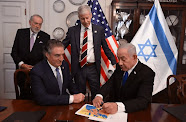Even when Trump and Netanyahu have diverged in private, they
have usually remained publicly in lockstep — apart from Trump
dropping a bomb last month during the shaky start of the Israel-Iran ceasefire.
As Trump turns his attention to ending the fighting in Gaza,
Netanyahu risks drawing the president’s ire once again.
“The
president gets frustrated because he wants this victory of having
brought peace,” said Elliott Abrams, US special representative for Iran during
Trump’s first term.
“I
think when it comes to Gaza, he recognizes that the problem is Hamas. So, it’s
frustrating to him that he can’t get the hostages out and get a ceasefire,
but he’s not blaming Netanyahu.”
Trump and his top envoy to the Middle East, Steve
Witkoff, say a deal is close.
“There’s nothing definite about war, Gaza and all the other
places, there’s a very good chance of a settlement, an agreement this
week, maybe next week if not,” Trump told reporters on Wednesday when asked
about the progress of his talks with Netanyahu.
Witkoff said Tuesday the two sides were now in
“proximity talks,” having whittled their disagreements down to one point.
A Palestinian source told the BBC that talks in
Doha have stalled over disagreements on the delivery of humanitarian aid and
Israeli military withdrawal.
It’s
not clear whether Trump will respect Netanyahu’s red lines — getting
Hamas out of Gaza and Israel retaining freedom of military operation — or push
the Israeli leader to accept a deal that would infuriate his right-wing allies
and risk toppling his governing coalition.
Trump has repeatedly broken with Netanyahu’s desires in the
Middle East, as demonstrated by his dropping sanctions on Syria’s new
government and engaging in direct talks with Iran. Yet this week the president
was notably deferential to his Israeli counterpart on questions about
the future of Gaza.
“Trump is the only US president who in his first 6 months
has both sidelined Israel and made it central to his successes and policies,”
Aaron David Miller, a veteran Middle East negotiator and senior fellow at the
Carnegie Endowment for International Peace, wrote Monday on the social
platform X.
“The Trump-Netanyahu bromance will last until it
doesn’t.”






